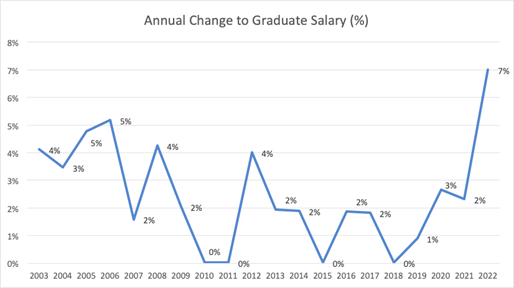In ISE’s latest poll, researcher Nicola Thomas explains the hike in graduate salaries and how pay for apprentices is growing faster.
With organisational pressures and a tight labour market, employers are working hard to ensure that recruitment teams are hiring and attracting the right candidates.
A huge part of the attraction in a competitive landscape is the remuneration package graduates and school leavers expect when starting a new role.
So how are employers responding?
Considering financial incentives more broadly, we found the most common financial incentives introduced in 2022 for graduates were a sign-on bonus, followed by interest free loans, then transportation allowance.
The most common financial incentives introduced for school and college leavers were a transportation allowance, interest free loans and a relocation bonus.
Looking at salaries, we find that the average pay growth for graduates is 7% this year, with some employers increasing salaries by 20%.
This is the sharpest rise in 20 years. On average, graduate salaries have risen 2% per year since 2002. The last time pay spiked was just before the financial crash of 2007/8 when they increased by 5% in 2006.
Pay is increasing due to inflation at a higher rate than the last 20 years
When analysing the changes to annual graduate salaries over the last 20 years (figure below), we can see that the 7% rise since 2021 remains significantly higher than previous increases.

These higher salaries are an indication of a healthy recruitment market. We have surpassed pre-pandemic levels of hiring and it’s competitive out there.
High salaries are one way to win the war for talent, but we’re also seeing additional benefits being offered such as support with wellbeing and flexible working patterns.
School leaver salaries
Following the introduction of the apprenticeship levy in 2017, salaries for school and college leavers have been increasing more rapidly than graduate salaries.
This year the average pay growth for apprentices is 11%. Some employers have said that they are increasing salaries for apprenticeships by as much as 50%.
Considering the apprentice salaries, these come from a lower base rate so they continue to increase faster on the whole. This year many employers are responding to the challenges young people are facing from the rising cost of living.
We spoke with one employer about the reasons for increasing salaries.
Nicola Lamplough, head of early careers at Experian said: “Due to the increased competitiveness in the market and our ongoing investment in our early careers pipeline, we have increased the entry salaries of the 2022 cohort by 10% for graduates and degree apprentices this year.
“As a world leading data company, the majority of the roles we recruit in the UK for our early careers programmes are in the tech/digital sector. They include roles like software engineers, IT application support and data analysts, which are becoming increasingly competitive as more companies look to hire in this sector.”
Taken together, high levels of inflation and a tight labour market are pressing the majority of organisations to increase the starting salaries for graduates and school and college leavers.
As this recruitment season begins to wind down, it is important to understand how increased salaries impacted on the levels of vacancies that were filled, and how companies can use remuneration strategically to meet business objectives.
Read ISE’s latest poll on salaries
Read more from Nicola Thomas ISE’s head of research


0 Comments